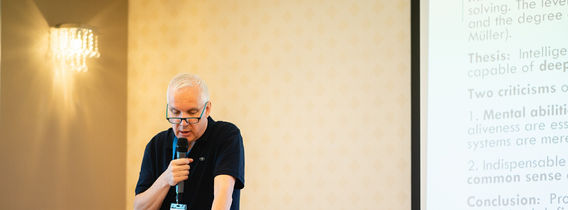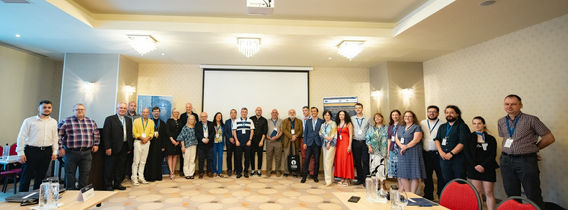
10th edition of international conference RELIGION, KNOWLEDGE, SOCIETY
Homo religiosus & homo technicus: discontinuities or congruencies?
June 20-21, 2024 Constanța (Romania)
Homo religiosus and homo technicus define two contextual paradigms of man in the course of history: man who lives in the religious horizon, a constant of his existence, and man who coordinates his life in the quotidian references of technological development. In essence, his life is strongly impacted by new technologies. The same man in the same society, but a society in constant transformation in all its aspects.
The conference intends a multilateral approach to the relationship between the religious dimension of man and the techno-scientific conditions of quotidian life. What is the relationship between homo religiosus and homo technicus and what are the perspectives of this relationship? Does current scientific development invalidate religious truth? What are the challenges of new technologies, especially artificial intelligence, for religious and ethical integrity?
Panels
-
Homo religiosus and homo technicus - definitions, interpretations, contextualizations.
-
The validity of religious truth and new technologies: antagonism or congruence?
-
The impact of new technologies on man from a theological, ethical, philosophical and psychological perspectives
Chairman
Ioan DURA - “Ovidius” University of Constanța (Romania)
Scientific Committee
Teodosie PETRESCU - “Ovidius” University of Constanta (Romania)
Bogdan MOISE - “Ovidius” University of Constanța (Romania)
Claudiu Ștefan TURCULEȚ - University of Medicine and Pharmacy "Carol Davila" Bucharest (Romania)
Michal VALCO - Comenius University of Bratislava (Slovakia)
Nicu GAVRILUTA - “Al. I. Cuza” University of Iasi (Romania)
Katarina VALCOVA - Comenius University of Bratislava (Slovakia
Cristina GAVRILUTA - “Al. I. Cuza” University of Iasi (Romania)
Abdul RASHID - University of Karachi (Pakistan)
Iulian DAMIAN - “Al. I. Cuza” University of Iasi (Romania)
Mendo HENRIQUES - Catholic University of Portugal (Portugal)
Mustafa ALICI - Erzincan Binali Yildirim University (Turkey)
Organizing Committee
Iustin DĂNILĂ - “Ovidius” University of Constanta (Romania)
Iulian ORDINSCHI - “Ovidius” University of Constanța (Romania)
Marina Roxana CREȚU - “Ovidius” University of Constanța (Romania)
Florin BUZILĂ - “Ovidius” University of Constanța (Romania)
Alina HAGEA - “Ovidius” University of Constanța (Romania)
Mircea Cristian PRICOP - “Ovidius” University of Constanța (Romania)
Florin SPANACHE - “Ovidius” University of Constanța (Romania)
Nicolae NIGA - “Ovidius” University of Constanța (Romania)
Organizing Institution
Faculty of Theology - “Ovidius” University of Constanța (Romania)
Partner Institutions
Văcăreștii Noi Monastery - Constanța (Romania)
Archiepiscopate of Tomis - (Romania)
Sponsors
Văcăreștii Noi Monastery - Constanța
Chalet La Țâlică, Șaru Dornei, Principală Street, no. 157
Chalet Kodru, Poiana Negrii, Gligu Street, no. 648
Keynote Speakers

MIRCEA DUMITRU
Vice-President of the Romanian Academy; University of Bucharest (Romania)
Mircea Dumitru is Vice-President of the Romanian Academy, elected in 2022; President of the Section of Philosophy, Theology, Psychology and Pedagogy (since 2021); Director of the Institute of Philosophy and Psychology "Constantin Radulescu-Motru" of the Romanian Academy (since 2021). Since 1990 he is professor at the Faculty of Philosophy, University of Bucharest. Between 2011-2014 he was President of the European Society of Analytic Philosophy; 2017-2020, President of the International Institute of Philosophy; 2019-2020, President of the Balkan Universities Association. He was Minister of Education and Scientific Research: July 2016 - January 2017.
He is specialized in philosophical logic, philosophy of language and analytical metaphysics of modality. He has published books, articles and chapters on topics such as modal logic, theories of truth, meaning, rationality, Wittgenstein's philosophy, contemporary logic (Quine, Kripke, Kit Fine), realism, essentialism, relativism. His teaching and research competences cover the fields of philosophical logic, symbolic logic, philosophy of language, metaphysics of modalities, epistemology, philosophy of mind and consciousness. He has also translated works by Nozick, Nagel, Wittgenstein, Quine, Forbes, Kripke.

SORIN BAIASU
Keele University, Uehiro Centre for Practical Philosophy - Oxford University (UK)
Sorin Baiasu is Professor of Philosophy at Keele University and Distinguished Research Fellow at the Uehiro Centre for Practical Philosophy, Oxford University; he is Director of the Keele-Oxford-St Andrews Kantian (KOSAK) Research Centre and Chair of the Steering Committee of the European Consortium for Political Research's Kantian Standing Group. His research focuses on themes in ethics, political philosophy, metaphysics and epistemology, particularly in the areas of Kantian studies, post-Kantian phenomenology and contemporary analytic philosophy.
His work has been financially supported by the British Academy, the European Commission and the European Research Council. He authored Kant and Sartre: Re-discovering Critical Ethics (2011) and edited (with Howard Williams and Sami Pihlström) Politics and Metaphysics in Kant, (with Mark Timmons) Kant on Practical Justification: Interpretive Essays (2013), Comparing Kant and Sartre (2015), (with Sylvie Loriaux) Sincerity in Politics and International Relations (2017), (with Alberto Vanzo) Kant and the Continental Tradition: Sensibility, Nature and Religion, and (with Mark Timmons) The Kantian Mind (2023).

ROXANA BAIASU
University of Birmingham; Stanford University Centre in Oxford (UK)
Dr Roxana Baiasu is Assistant Professor at the Institute for Mental Health, School of Psychology, University of Birmingham; Associate Member of the Philosophy Faculty, University of Oxford; and Fellow at the Stanford University Centre in Oxford.
Her current interests include: philosophy of mental health and more specifically, phenomenological and ethical approaches to mental health, vulnerability, resilience and well-being. She has written articles on these topics in prestigious journals and in edited volumes published by Routledge, Palgrave Macmillan and Springer. She has also written in the areas of Post-Kantian metaphysics and epistemology, philosophy of religion and feminist philosophy. She edited (with G. Bird and A.W. Moore) Contemporary Kantian Metaphysics Today: New Essays on Time and Space (Palgrave Macmillan, 2012), and published in, among others, The Southern Journal of Philosophy, IJPS, Research in Phenomenology and Sophia. She is currently writing a textbook commissioned by Wiley on feminist philosophy.

ALEXANDRU MANAFU
York University, Department of Philosophy (Canada)
Dr. Alexandru Manafu is Associate Professor at York University (Canada). His interests are in the philosophy of science (especially the physical sciences), and the metaphysics of science, where he had done work on reductionism and emergence, as well as on natural kinds. He is also interested in the philosophy of psychiatry. Before joining the philosophy department at York University, he was a postdoctoral researcher at the Institute for History and Philosophy of Science and Technology, University of Paris 1 Panthéon-Sorbonne, where he iscurrently an associate member.
Publications: Multiple Realizability and Levels of Reality. (Ed.) Special issue of Studies in History and Philosophy of Science Part A 68:1-2 (2018); “A Novel Approach to Emergence in Chemistry” In Scerri, E., and McIntyre, L., editors, Philosophy of Chemistry. Growth of a New Discipline. Boston Studies in the Philosophy and History of Science. Volume 306, 2015, pp. 39-55; What Role Should Near-Death Experiences Play in the Lives of Those Who Have Undergone Them? Theological Puzzles (Issue 9), 2022; An Experiential Education Approach to Teaching the Mind-Body Problem. Teaching Philosophy, 44(1) (2021), 11–27; “Internal Realism and the Problem of Ontological Autonomy”, Foundations of Chemistry, Volume 15, Issue 2 (2013), pp. 225-228.


































